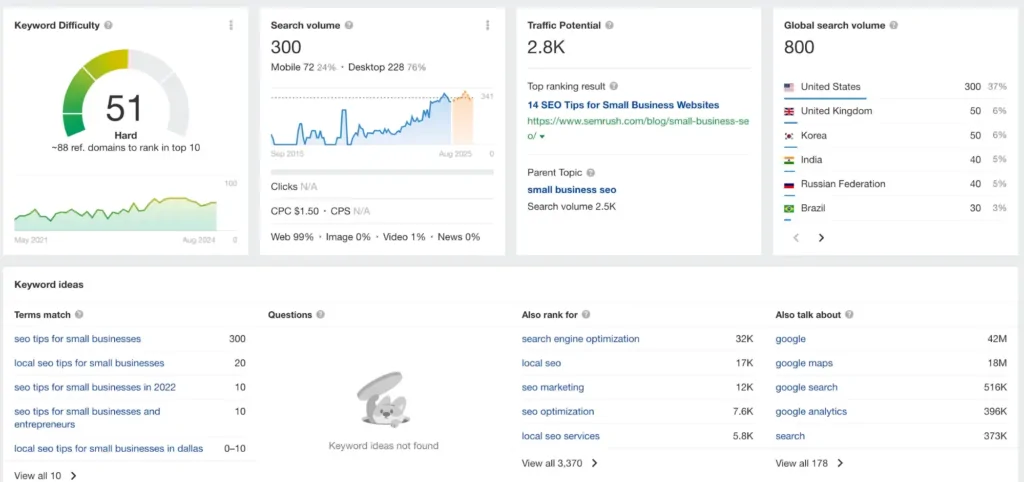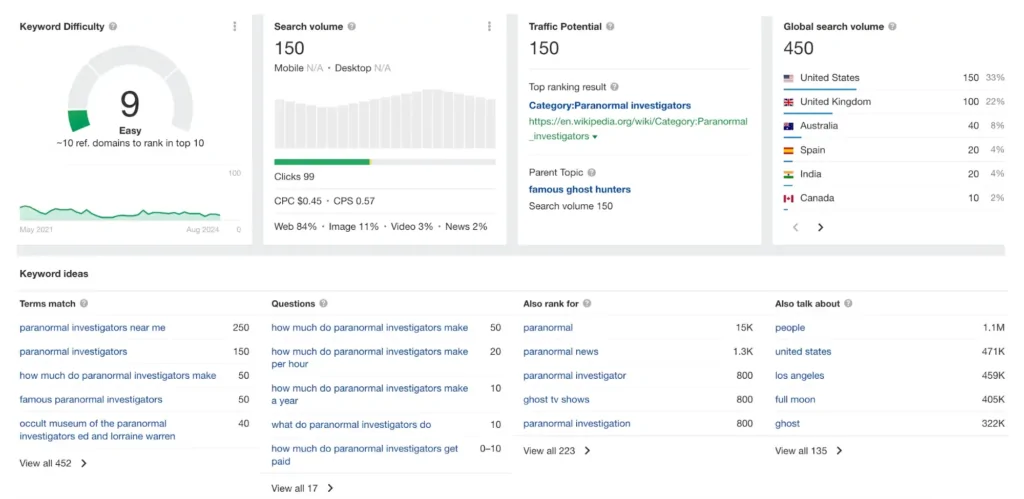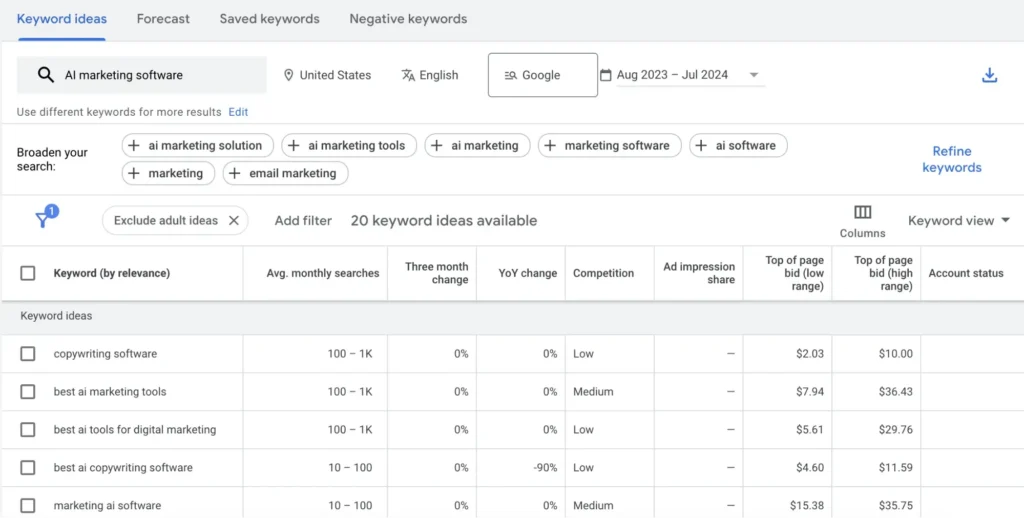Keyword research for SEO is a fundamental aspect of Search Engine Optimization (SEO), playing a critical role in improving your website’s visibility and overall success.
By identifying and targeting the most relevant and high-traffic keywords, you can significantly enhance your website’s ranking in search engine results pages (SERPs) and attract more organic traffic from users actively seeking information, products, or services you offer.
Whether you’re a beginner or have some experience with SEO, understanding how to perform effective keyword research for SEO can greatly boost your SEO efforts.
Mastering keyword research for SEO will also help you stay competitive in the ever-evolving digital landscape, ensuring your content resonates with your target audience.
1. What is Keyword Research?

Keyword research for SEO is the process of discovering and analyzing the search terms that people enter into search engines like Google, Bing, and Yahoo when looking for information, products, or services.
These search terms, also known as keywords, represent the words and phrases your potential audience is using to find content relevant to their needs.
By identifying and targeting the right keywords, you can optimize your website’s content to rank higher in search engine results pages (SERPs), making it easier for users to find your site.
Essentially, keyword research helps you understand what your target audience is looking for and ensures your content aligns with their intent.
2. Why is Keyword Research Important?
Keyword research is crucial because it informs your entire SEO strategy. Without proper keyword research, you’re essentially guessing which terms your audience is searching for, leading to missed opportunities for traffic and conversions.

Here are some key reasons why keyword research is important:
- Improves Organic Visibility: By optimizing your content for the right keywords, your website is more likely to appear in search results for those specific terms. This improved visibility increases the chances of attracting relevant traffic, meaning users who are genuinely interested in what you offer.
The more your content aligns with the search queries of your target audience, the more likely it is that your site will appear in front of them, driving not just more traffic, but also higher-quality visitors who are likely to engage with your content.
. - Connects with User Intent: Understanding the intent behind specific keywords allows you to tailor your content to better meet the needs and expectations of your audience.
When your content directly addresses the questions or problems that users are trying to solve, it leads to higher engagement, longer time spent on your site, and ultimately better conversions.
Matching content to user intent means you’re not just attracting visitors but providing them with a satisfying, relevant experience, which is key to building trust and loyalty.
. - Drives Targeted Traffic: When you target the right keywords, you attract users who are actively searching for what you offer, leading to more targeted and higher-quality traffic.
These visitors are more likely to convert into leads or customers because their search queries are aligned with the products, services, or information you provide.
By focusing on the right keywords, you can reduce bounce rates and increase the likelihood of achieving your website’s goals, whether that’s making sales, generating leads, or growing your audience.
. - Outperforms Competitors: Conducting thorough keyword research gives you valuable insights into the keywords your competitors are ranking for and targeting. This allows you to identify potential gaps or weaknesses in their SEO strategy and discover opportunities to outperform them.
By finding keywords that are underserved or where your competitors are lacking, you can create more optimized content and better position your site in search rankings, helping you gain a competitive edge in your industry.
. - Boosts Content Strategy: Keyword research is an essential part of shaping your content strategy. It informs the types of articles, blog posts, and web pages you should produce by revealing what your audience is searching for most frequently.
By creating content that addresses popular and relevant topics uncovered through keyword research, you can better meet the needs of your audience, enhance your SEO performance, and position your brand as a thought leader in your industry.
.
3. Elements of Keyword Research
When conducting keyword research, it’s essential to understand and evaluate three key elements: Relevance, Authority, and Volume.
1. Relevance
The relevance of a keyword to your business or website is critical. If your content isn’t relevant to the keyword you’re targeting, then it won’t matter if you rank for it—you won’t be able to convert visitors into customers.

Ensure that the keyword aligns with the subject matter of your website and resonates with your target audience.
2. Authority
Search engines rank content that they believe is authoritative. The more high-quality backlinks and content you have, the more likely you are to rank for a keyword.
If your site is well-established in your niche and viewed as a reliable source of information, it’s easier to rank for more competitive keywords.
3. Volume
Search volume refers to how often a keyword is searched within a given timeframe. While it’s tempting to target high-volume keywords, those are often the most competitive.

Striking a balance between volume and competitiveness is crucial for SEO success. Additionally, long-tail keywords—phrases with lower search volume but more specific intent—can be valuable for attracting niche audiences.
4. How to Research Keywords for Your SEO Strategy
Researching keywords requires a strategic and thoughtful approach, involving more than just plugging terms into a tool and hoping for the best results.

It requires a deep understanding of your audience, your business goals, and the search landscape. Here’s a comprehensive step-by-step guide to help you get started with your SEO keyword research:
1. Make a List of Important, Relevant Topics Based on What You Know About Your Business
The first step in effective keyword research is to brainstorm general topics that are relevant to your business or industry. These topics should reflect what you want your website to rank for in search engine results.
Think about the core themes that define your business and what your target audience is most likely searching for.
For example, if you run a digital marketing agency, your list of important topics might include “SEO,” “content marketing,” “social media management,” “PPC advertising,” and “email marketing.” These broad categories serve as the foundation for more specific keyword research.
2. Fill in Those Topic Buckets with Keywords
After you have created your list of core topics, the next step is to fill each one with related keywords or search terms that your target audience might use.
These keywords should be specific enough to reflect actual searches but broad enough to cover a range of related queries.
For instance, under the topic “SEO,” you might identify related keywords such as “On-page SEO,” “SEO strategies for small businesses,” “best SEO practices in 2024,” “how to improve SEO rankings,” and “SEO keyword research tools.”
These are examples of the specific phrases your audience could use when searching for information on these topics.
3. Understand How Intent Affects Keyword Research and Analyze Accordingly
One of the most important factors in keyword research is understanding the search intent behind different queries. Search intent refers to the reason a user types a specific query into a search engine.
There are typically three types of search intent: informational (looking for information), navigational (looking for a specific website or page), and transactional (ready to make a purchase or take action).
Understanding the intent behind a keyword allows you to tailor your content to meet the specific needs of users. For example, if many of the keywords in your list are informational, you might prioritize creating detailed blog posts, guides, or how-to articles to match the user’s intent.
If the search intent is transactional, focusing on landing pages, product descriptions, and calls-to-action might be more appropriate.
4. Research Related Search Terms
Don’t stop with the keywords you initially brainstormed—there are always more opportunities to find related terms. Researching related search terms can provide valuable insights into what else your audience is searching for, giving you more options to optimize your content.
One way to find related keywords is to look at Google’s “related searches” feature, which appears at the bottom of the search results page. This often reveals additional keywords that may not have come to mind initially.
These related terms are often variations or extensions of your primary keywords, and incorporating them can help you broaden the scope of your content, increase relevance, and attract more traffic to your website.
5. Use Keyword Research Tools to Your Advantage
Leveraging keyword research tools is one of the best ways to refine and expand your keyword list. Several tools are available to help you analyze the performance of different keywords, find new keyword opportunities, and evaluate their competitiveness.
Some of the most popular tools include Google Keyword Planner, Ahrefs, etc. These tools provide essential data such as search volume, keyword difficulty, competition levels, and even insights into which keywords your competitors are ranking for.
Using these tools allows you to make data-driven decisions about which keywords are most likely to deliver the best results for your SEO strategy.
5. How to Find and Choose Keywords for Your Website
Once you’ve compiled a list of potential keywords, the next step is to refine and prioritize them. Here’s how to find and choose the best keywords for your SEO strategy:
1. Use Google Keyword Planner to Cut Down Your Keyword List
Google Keyword Planner is a free tool that helps you identify the search volume and competition level for specific keywords. By using this tool, you can eliminate keywords that are either too competitive or have insufficient search volume.

2. Prioritize Low-Hanging Fruit
Low-hanging fruit refers to keywords that are less competitive but still relevant and valuable. These keywords offer a better chance of ranking quickly and driving traffic to your site.
Look for keywords with moderate search volume but low competition and focus on optimizing for these terms.

3. Check the Monthly Search Volume (MSV) for Keywords You’ve Chosen
Monthly search volume (MSV) refers to the average number of searches a keyword receives each month. Knowing the MSV for each keyword can help you prioritize which terms to target based on their potential to drive traffic.
However, balance is key: don’t just chase high-volume keywords if they are overly competitive.
4. Factor in SERP Features as You Choose Keywords
SERP features, such as featured snippets, local packs, and knowledge graphs, can impact which keywords you should prioritize.
For example, if a keyword frequently triggers a featured snippet, ranking in the top position could bring substantial traffic, so it might be worth targeting.
5. Check for a Mix of Head Terms and Long-Tail Keywords in Each Bucket
Head terms are shorter, more generic keywords (like “SEO”), while long-tail keywords are longer, more specific phrases (like “how to do keyword research for SEO beginners”).
It’s important to target a mix of both in your strategy. Head terms generally have higher search volume and more competition, while long-tail keywords may have less traffic but higher conversion rates.
6. See How Competitors Are Ranking for These Keywords
Examining how your competitors rank for certain keywords can reveal opportunities for your SEO strategy.
Tools like Ahrefs allow you to analyze competitor rankings, traffic, and backlink profiles, helping you identify gaps in their strategy and areas where you can outrank them.
6. Best Keywords for SEO
Selecting the best keywords for SEO is an ongoing process that requires careful consideration, analysis, and adaptability to keep up with changing trends and user behavior.
The right keywords will ultimately depend on your industry, target audience, and specific business goals, but there are several key principles that can guide you toward making the best choices for your SEO strategy.
Remember, keyword research isn’t a one-time task—it’s a dynamic process that evolves over time as search engines and user preferences change.
Target Keywords with High Relevance
Keywords should be closely related to your business offerings, products, or services. If a keyword doesn’t align with the core subject matter of your content or the interests of your audience, it won’t attract the right kind of traffic to your site.
In other words, relevance is critical for driving high-quality visitors who are more likely to engage with your content and convert into customers.
Look for Moderate Competition
While high-volume keywords can be tempting because they indicate lots of search traffic, they are often dominated by large competitors or established brands in your industry.
Instead of competing directly with major players, focus on finding keywords with moderate search volume and lower competition. These keywords are often more attainable and can provide quicker wins in terms of improving your site’s rankings and visibility.
Emphasize Long-Tail Keywords
Long-tail keywords are specific, often multi-word phrases that tend to have lower search volumes. However, they are often more valuable because they reflect more defined and targeted search intent.
Users who search for long-tail keywords are usually further along in their buying journey, closer to making a purchasing decision, or have a specific need in mind. This makes long-tail keywords crucial for driving higher conversion rates and attracting qualified traffic.
Check for Opportunities in SERP Features
Certain keywords trigger special search engine results page (SERP) features like featured snippets, knowledge panels, or image carousels, which can enhance your visibility beyond traditional rankings.
If you can optimize your content to target these rich results, you can capture additional real estate on the results page, making your website more prominent and likely to draw more clicks.
Final Say
Keyword research is the foundation of any successful SEO strategy. By understanding your audience, researching the right keywords, and implementing them strategically across your website, you can improve your search rankings, drive targeted traffic, and ultimately achieve your business goals.
While it requires time and effort, mastering keyword research will pay off by helping you create valuable content that connects with your audience and improves your online presence.



![How to Build a LinkedIn Marketing Strategy [Free Template]](https://technaseer.com/wp-content/uploads/2025/02/1696446402112-300x169.jpeg)


